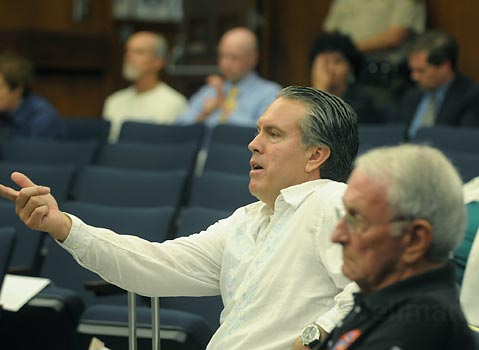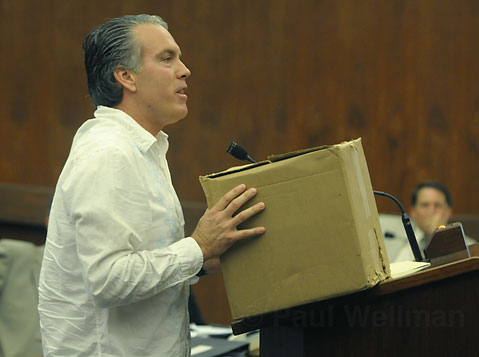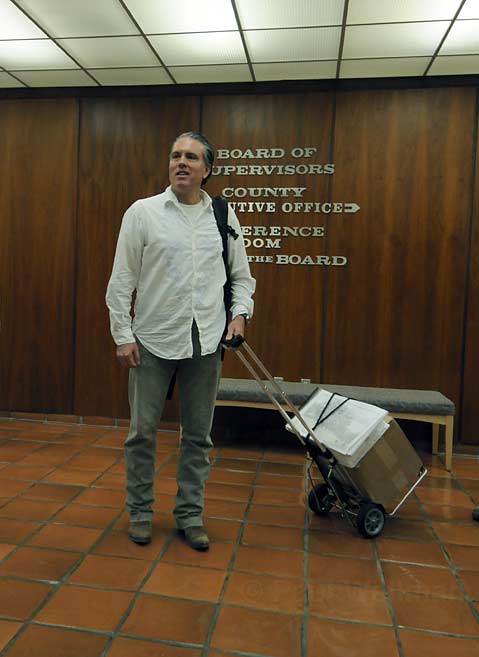Naples Plans Hit Major Snag
Board Votes to Rescind Naples Development Agreement

It must have felt like an incredibly painful sort of dej vu for hopeful Naples developer Matt Osgood at the county supervisors’ this week. Nearly one year to the day since his controversial 71-mansion plan for the historic ranch at the eastern gate of Gaviota was narrowly approved by a previous incarnation of the board, the Orange County-based developer was once again before the supes wrestling over the fate of his long-stewing project-only this time he lost. In a rather significant turn of events, the new board majority (1st District’s Salud Carbajal, 2nd District’s Janet Wolf, and 3rd District’s Doreen Farr) created an ordinance that rescinds the development agreements approved by the board last year. Though not necessarily a death blow to Osgood’s development dreams, the new ordinance-which is slated to be finalized next week- not only greatly reduces the likelihood that houses will be built at Naples anytime soon, but it also-perhaps more importantly-gives the current supervisors newfound authority over what exactly the final project will look like. “I have been in this process for 11 years,” explained a visibly upset Osgood before the fateful votes were cast. “It is shameful that you are even considering this.”

It has been a confused and twisted road for all parties involved since Osgood won project approval and two development agreements (one for the inland portion of the project and one for the coastal) from the county late last October. Once Doreen Farr, who ran on a pro-preservation platform, replaced Brooks Firestone as the 3rd District Supervisor in early January, the wheels almost immediately started coming off Osgood’s wagon. Allegations of a Brown Act violation, levied by attorneys for the Naples Coalition and the Surfrider Foundation in response to a closed-session decision by the Firestone board to separate the inland and ocean side portions of the project into two distinct ventures, saw the new board reopen the debate and ultimately decide, much to the consternation of Osgood, to officially re-link the project.
Of the mindset that the project was always two separate entities since he first started running the approval gauntlet more than a decade ago, the new coupled configuration irked Osgood to such a degree that he terminated the Memorandum of Understanding (MOU) between him and the county in early spring, something that had been helping guide the whole process for several years. In the months since, county staff has struggled to translate what exactly a terminated MOU would mean for the development agreements and figure out the paperwork necessary to move the project along to the Coastal Commission and the Department of Conservation for final sign-off. The uncertainty rose to such a degree that three times this past summer the supes had false starts in trying to resolve the situation, once voting to continue the matter and twice simply rescheduling meetings to a future date. All that ended this week.

Hanging their hats on the terminated MOU, the recent For Sale signs at neighboring Dos Pueblos Ranch (lot mergers at the ranch and a massive agricultural conservation easement on the property were part of the Naples approval last fall), and an as yet unsatisfied request by the Coastal Commission for further biological review, the majority of the supes decided too much had changed in the 12 months since the development agreements were agreed upon. They therefore voted to create an ordinance that undoes the agreements so as to free the board’s hands and allow them to tinker with the contracts accordingly. The vote was 3-2, with Joni Gray and Joe Centeno opposed.
For Osgood, the decision was an understandably tough twist of fate after years of working and reworking his designs-spending, by his estimation, more than $2 million on county fees, environmental impact reports, and Transfer of Development Rights studies-and eventually gaining an approval. In short, he felt betrayed and let down by what he described as the lack of “good governance.” Even before Tuesday’s vote, he opined, “Obviously, I would rather win than lose, but with government, the least you hope for is that things are fair. I mean, Farr won’t even take a meeting with me anymore. I feel like I’m not in America.”
As for the future, unless things change when the finalizing vote is taken, the approved project will move on to the Coastal Commission level in the coming months. In the meantime, Osgood’s lawyer Stanley Lampwert summed up their take on this week’s development when he said to the board (no doubt hinting a future day in court), “This will produce results you don’t understand and will not appreciate.”



